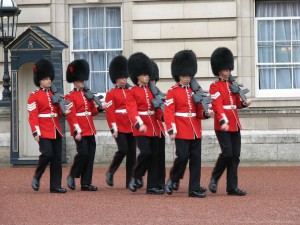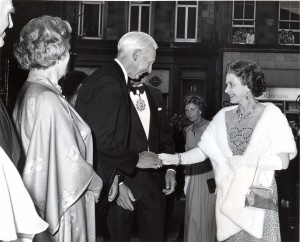The recent royal visit offers a good chance to talk about monarchy in Canada. Besides just being nice Canadians, the people who greeted the newly married royal couple were often ecstatic, filled with genuine love for the two people, one of which has done nothing of significance while the other has never been heard of until recently. Despite a minimal role in Canada, the monarchy seems to enjoy support here, and the republican groups occupy the margins of our political discourse. But the history of the Canadian democracy is the history of overcoming the monarchy. All the good things we are proud of: the rule of law, democratic elections, and civil rights—emerged despite the monarchy and often out of conflict with the monarchy. Today, Canada’s democracy is the fruit of the monarchy’s defeat. The royals have zero power in this country. The Queen is Canada’s head of state only on paper, and many people don’t know or remember that this is the finale of a centuries-long fight between the people and the monarchy. But besides the remaining formal royal footprints on our political system, there are other, more substantial remnants of monarchy in the Canadian government and legal system.
The less monarchy we had in Canada, the more democracy we had. The history of Canada’s democracy is the history of pushing back the monarchy until it was reduced to a rubber stamp for our democratically elected legislators. It is the triumph of the Canadian democracy that the Royal Assent is a formality. Monarchs have not always been as likable as the young couple from London, UK. In 1776, the US Declaration of Independence called the British rule “absolute Despotism.†Five centuries earlier, English nobles forced their king into signing Magna Carta—a historic document that granted civil liberties and limited the royal power. Magna Carta, a blueprint for modern democratic constitutions, came about in spite of the monarch. The barons basically fought with the king for their rights. That’s the role of the monarch in our democratic tradition: give up more and more power to the people as the royal vigour increasingly declines.
Magna Carta—a historic document that granted civil liberties and limited the royal power. Magna Carta, a blueprint for modern democratic constitutions, came about in spite of the monarch. The barons basically fought with the king for their rights. That’s the role of the monarch in our democratic tradition: give up more and more power to the people as the royal vigour increasingly declines.
The era of the strong monarchy also represents the backward times of racism and religious discrimination. The monarchy itself remains discriminatory: no Catholics and no bloodline outsiders. If any Canadian institution used the rules of succession to the British throne, the public would ostracize that institution and the courts would probably stop the practice. But the Ontario Superior Court of Justice refused to apply anti-discrimination provisions of the Charter to the rules of succession to the British throne. In 2003, Justice Rouleau of the Superior Court essentially recognized the British throne and the Queen as a foreign institution governed by foreign rules inherited by our constitution (O’Donohue v. Canada, 2003 CanLII 41404 (ON SC)). Since we can’t change the foreign rules and we can’t change our constitution, we are stuck with the discriminatory foreign monarchy.
Some of the best things about Canada are the rule of law, civil liberties, and a democratically elected legislature. The view that the monarchy somehow links us to the English legal and political tradition that gave us all those things is quite absurd. We owe much of our legal and democratic tradition to England, but that tradition emerged in England despite the monarchy. Democratic rights and the independent judiciary were a concession by the monarchy in favour of powerful land owners, first, and the general public, later. Besides, much of our Canadian democratic tradition is completely domestic, and some was borrowed from the US. While we have two Constitution Acts, the UK doesn’t even have a written constitution.
When we see the royal couple on TV, we should remember that they symbolize an institution that fought long and hard against civil liberties, the rule of law, and a democratic legislature. That institution has completely lost its power as a result of this conflict. The people and the democracy have won. For some reason, we still allow the royals to live in palaces and act out a fairy tale at our expense.
But there are other dangers in the monarchy fetish, especially in its recent revival. Our government still retains some qualities of the monarchy. Generally, these powers of the Prime Minister and the Cabinet are called the royal prerogative. These are the powers that the monarchy has always enjoyed but that do not come from the constitution, an act of parliament, or the common law. These are basically the powers that the government has not surrendered to Parliament or to provincial legislatures. This is, for example, the power to have foreign relations. When the courts reviewed the Prime Minister’s decision not to request the repatriation of Omar Khadr, government lawyers argued that his decision was an exercise of the royal prerogative and not subject to Charter scrutiny. The courts have rejected this position (Canada (Prime Minister) v. Khadr, 2010 SCC 3).
Besides the royal prerogative, the government has a wide array of powers that give it discretion in making decisions. Discretion means the government is less accountable about the rules and reasons it follows in making a decision. Often we want to give the government discretion for the sake of efficiency, but the courts must be able to control the limits of discretion and to overturn obviously unreasonable decisions. This is how the rule of law works.
Fascination with the monarchy can produce or can be a symptom of a lower expectation of accountability from the government. We may defer to the government more and more. The danger is when we start treating the government as a benevolent ruler. Governments are made of people, and people are corrupted by unaccountable power. The history of democracy in the UK and in Canada was a history of people taking the power back from the ruler.
The ceremonial formality of the Queen also breeds constitutional uncertainty, for example, when the Prime Minister prorogues Parliament so often that some parts of the public genuinely expect the figurehead governor-general to refuse to cooperate. She of course, did cooperate and that was the right thing to do from the legal standpoint, but the potential for a crisis exists.
Do we even need a head of state? It is an inheritance from the Middle Ages, when every nation had a powerful ruler. Modern democracies have leaders but they should be professional officials hired for a limited term, and nothing more. Prime ministers should not generate patriotic fervor. They must be professional politicians who embody certain popular political platforms. Let’s hope that prime ministers cannot mess up too much, and fortunately we have the ballot and the independent judiciary to hold them and their ministers to account. A foreign figurehead doesn’t really figure in this equation.
Pulat Yunusov is a Toronto litigation lawyer.
![]()
(Post sponsored by AdviceScene)

Exactly. If the GG is supposed to act as a kind of a check on the PM’s power, but the GG is an unelected, ceremonial figurehead, that leaves us with an unaccountable head of government. Even more so when you take into account the courts’ inability or reticence to wade into certain actions that the government stamps “Royal Prerogative” all over. Will and Kate are nice people, but Canadians need to get back to reality and remember that we still have a democracy to run.
Over here in the UK, the royals popularity is on the rise, especially with the likable newly weds.
But we to have similar problems, with democracy, not least an unelected house of lords (2nd chamber) that can delay or even prevent the law making powers of the House of Parliment.
Add the queen’s right of Royal Preogative and democracy could be considered questionable in its truest sence.
Really it is very interesting to read because it is of full olden american’s history.